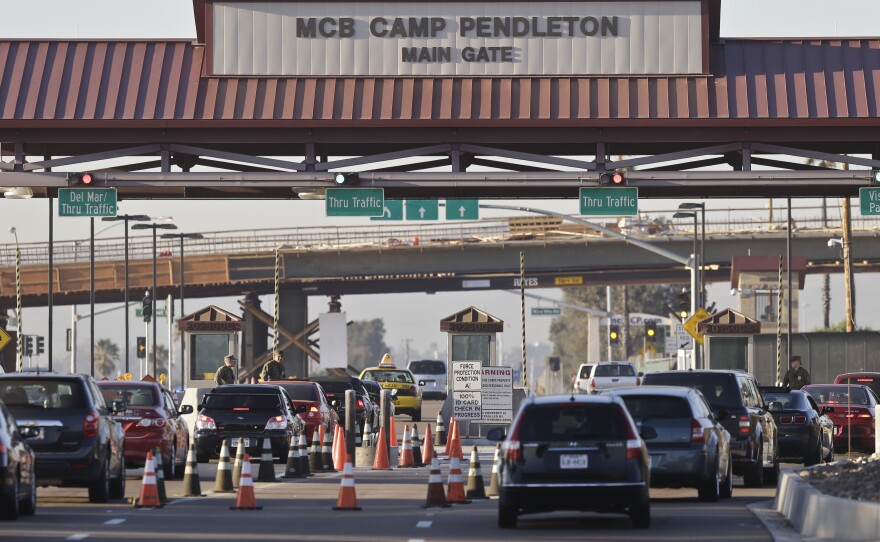The history of military and law enforcement personnel being entangled in human smuggling goes beyond the 13 Marines accused in connection with a human trafficking operation.
The First Marine Division released a list of charges Friday. The Marines are accused of being part of a ring that transported migrants from the border to locations in central and northern San Diego County. They are all junior Marines. None of them made more than $23,000 a year. According to 28 pages of redacted charges, all of the 13 charged are from 5th Regiment at Camp Pendleton.
The charges stem from an investigation prompted by the July 3 arrest of Lance Cpl. Byron D. Law and Lance Cpl. David J. Salazar-Quintero. Border Patrol agents had spotted three migrants climbing into their civilian car on the side of the highway close to the border.
The Marines did not release any of their names, but six are charged directly with driving migrants from the Mexico border. The earliest case is from May 19. The most recent case is July 10, when a third Marine was detained by the Border Patrol. All of the other Marines are charged with lesser offenses such as perjury and drunkenness. One Marine is accused of smashing a cell phone to conceal evidence.
Smugglers often enlist young drivers who aren’t from San Diego, according to Theron Francisco, spokesman for the Border Patrol in San Diego.
“They’re not familiar with the border,” he said. “They’re not familiar with the Border Patrol or how the border region works. And that just plays into the hands of the smugglers. They don’t give them a lot of information. They just keep it very vague. You just need to pick up some people and bring them here.”
In exchange for driving migrants north from the Mexico border to a safe house, the two Marines who were originally charged told prosecutors they were promised $1,000.
“These smugglers may see it as a benefit on their behalf to have a Marine or someone in law enforcement to be a potential load driver,” Francisco said.
Last year, Border Patrol arrested a California National Guard member in San Diego County for transporting migrants. Smugglers have worked with Marines at Camp Pendleton as early as the late 1970s.
In 1979, dozens of marines were caught transporting migrants through Camp Pendleton to get around an immigration checkpoint on Interstate 5. The rings included a group of marines and their wives. Border Patrol used undercover agents and the Marines set up surprise checkpoints inside the base. Through October 1979, 38 military personnel and 48 civilians were caught smuggling migrants through the camp. Some of the vehicles used stolen base stickers or stickers brought on the black market. Several hundred migrants were caught inside the base each month that year, according to the San Diego Union.
The lure of what some see as easy money continues to enjoy widespread appeal. Plenty of people without ties to the military get caught up in smuggling, said Pedro Rios with the American Friends Service Committee, who has worked on migrant issues since the 1990s.
“The fact that there is a border wall doesn’t stop this type of activity from taking place on either side,” he said. “There’s always been an attempt to infiltrate some of these agencies, such as border patrol and exploit some of the loopholes that they have.”
Smuggling networks have become more elaborate as measures to maintain the border have become more restrictive, he said.
“If the Marines have been infiltrated in this way, might there we other agencies in the law enforcement world that have been infiltrated as well,” Rios said.
The highest-profile smuggling case in San Diego County doesn’t involve the Marine Corps. Two brothers, Fidel and Raul Villareal, worked as Border Patrol agents and were convicted in 2013 of taking bribes to move migrants across the border in San Diego. In 2018, Raul’s attorney argued that his 30-plus-year sentence should be lowered, before a panel that included federal Appellate Court Judge Susan Graber.
“These people violated their trust and did exactly the opposite of what they were hired by the people to do,” Graber said, as she questioned Raul’s attorney.
In the most recent case involving the Marines, the ring isn’t described as being nearly as sophisticated as the one involving the two convicted border patrol agents. The Marines aren’t releasing names until the convening authority decides which Marines will face courts-martial.
Federal officials have dropped the case against the original two Marines charged with human smuggling, so they can be tried in military court.
Marines originally arrested in July reportedly did not get paid by the smugglers. The Border Patrol says its a sign of how hard-nosed human traffickers can be with the people they recruit.







